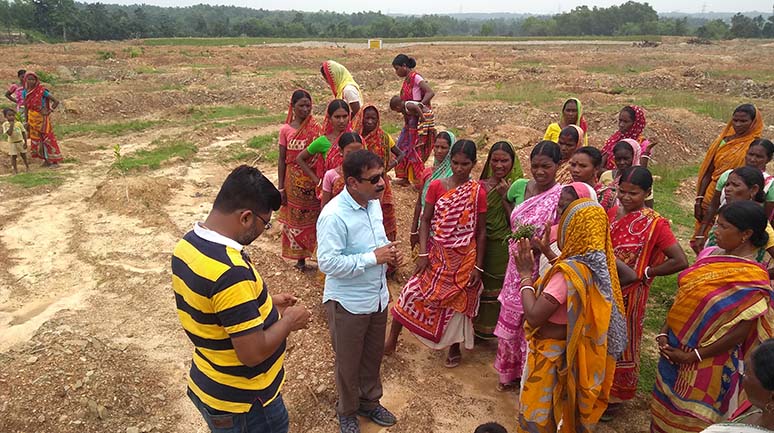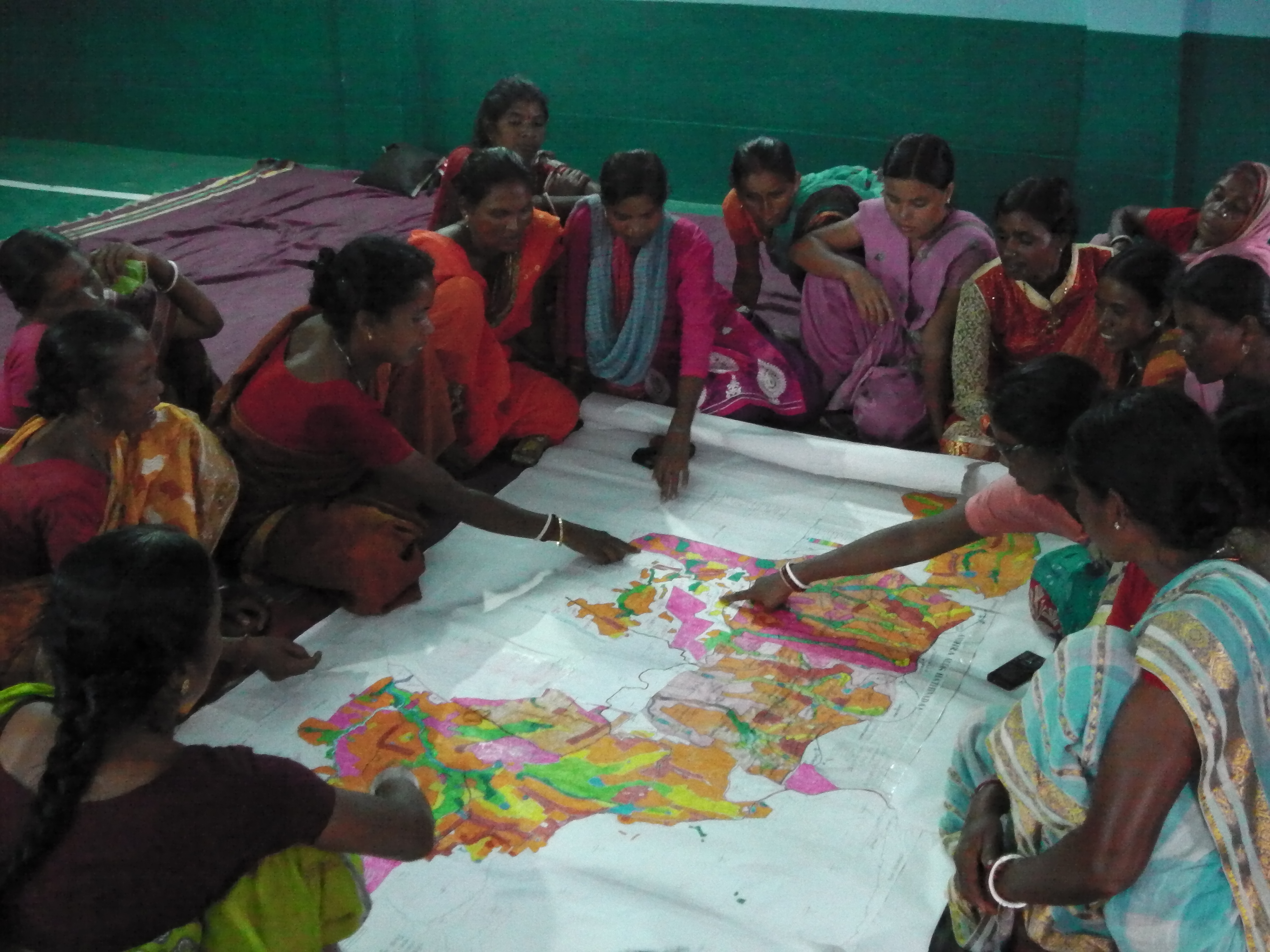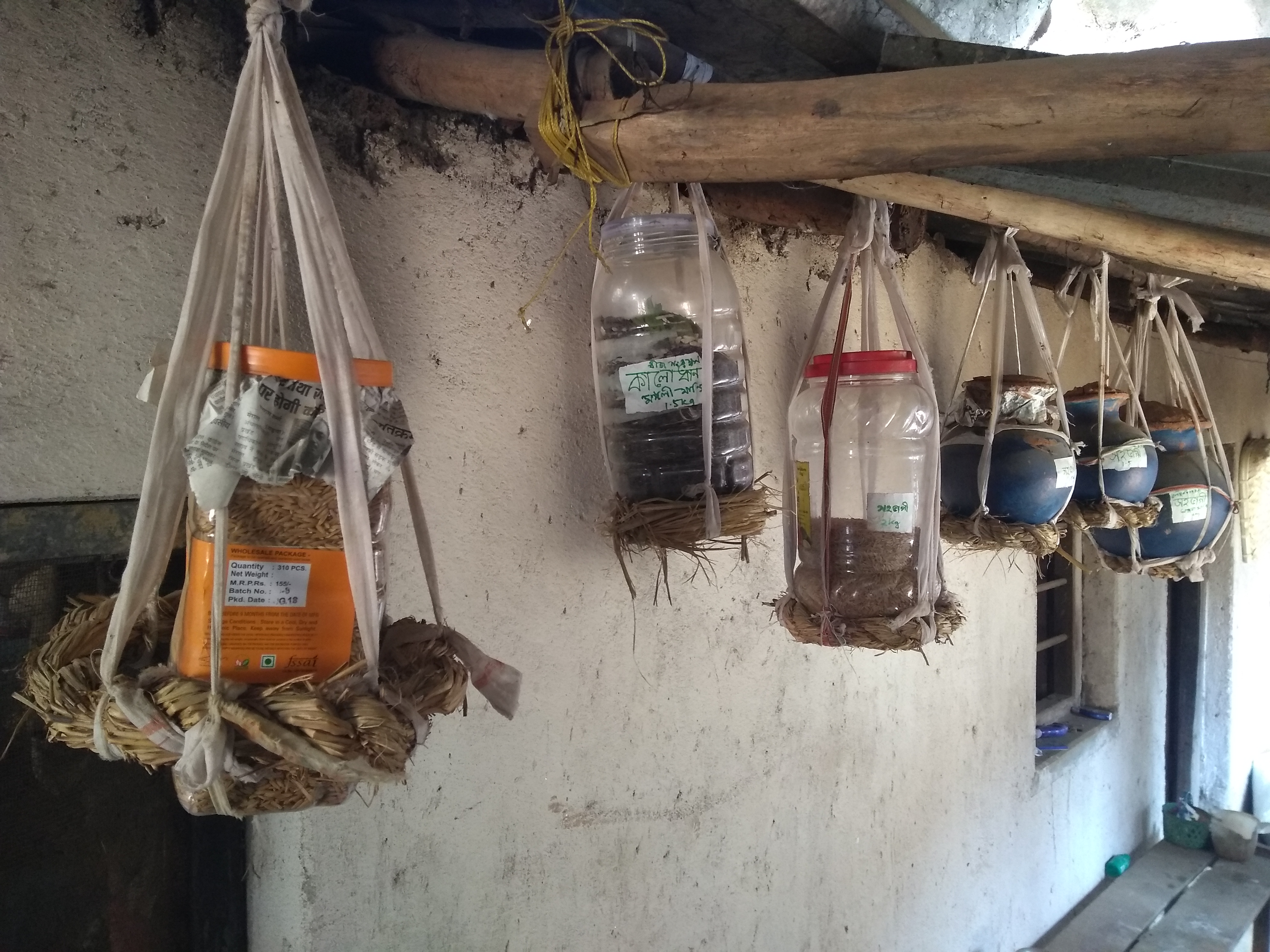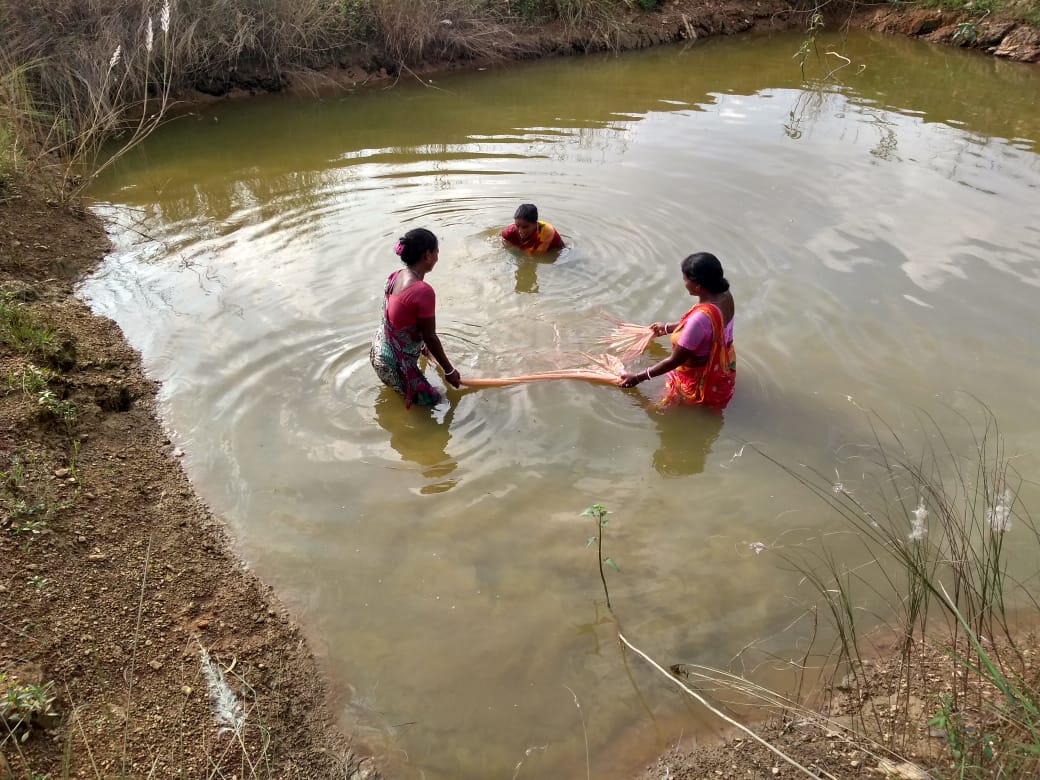Empowering Women, Anchoring Change: Collaboration and Persistence Show the Way

With a little bit of support and encouragement, the women of the community prove to be natural leaders, stepping into the unknown, being capable of taking decisions, and carrying forward the work of improving the standard of their lives, physically and economically. The women of Majhidi-Gokulnagar exemplify this in no uncertain terms.

SHG members explaining the need for water harvesting structures to the WBADMIP official in Majhidi-Gokulnagar village
Social change does not happen overnight. It requires willpower, solidarity, and close and consistent association with the community over a period of time. It means perseverance, courage and hard work by any organization or any Development Practitioner, as was amply clear in Majhidi-Gokulnagar, a remote village of Barabazar block, Purulia district, West Bengal.
“Amra ekhane kono samasya hote nai dibo...jeidin kono samasya hobe seidin kaj bandha kore debein; amra kichu ar nai bolbo (We will not let any problem happen...You may stop work the day there is any problem or obstacle; we will not stop you),” said Sumati Majhi and Anjana Mandi to the West Bengal Accelerated Development Micro-irrigation Project (WBADMIP) officials.
Background
The land in the Majhidi-Gokulnagar village yielded a single crop because most of the water flows away as runoff due to the lack of an effective rainwater harvesting system. As a result, Majhidi-Gokulnagar village, like other villages, faces water crisis and drought at least once every two years. In various conversations, the villagers of Majhidi hamlet spoke of the problems they face because of the non-availability of water for irrigation. They shared their experience of the water harvesting structure (WHS) developed under the Special Swarnajayanti Gram Swarojgar Yojana (Spl, SGSY) programme in 2007–09. Under the supervision of the women’s Self Help Group (SHG), 42 WHSs (the average size being 50 ft long, 50 ft broad and 10 ft deep) were created, benefitting about 68 families. Arrangements were made to retain 17,000 cu m of water in those WHSs; it helped families cultivating paddy in the medium uplands where irrigation is needed during the panicle stage as well as for the second crop. The impact of these structures was visible to all. However, these structures did not mitigate the issues around irrigation entirely.
In 2017, the World Bank funded the WBADMIP project in the area, that included Majhidi-Gokulnagar village. The project focuses on land development, developing irrigation infrastructure and enhancing the agricultural income in this poverty-ridden, tribal-dominated village. When we told the community about the project, there was huge interest among the villagers about the project. During the need identification mapping, almost 90 per cent of the families showed interest in creating more WHSs in their fields, to mitigate their plight due to lack of water for irrigation. The project gave this top priority.
Planning Phase
The WBADMIP officials visited the area a couple of times before the project started in 2017. They had meetings with the SHG collectives and discussed how the Spl-SGSY programme was implemented in the village; what role the SHGs shouldered; how they maintained the records and monitored the work. In yet another meeting, the WBADMIP officials expressed their fears of political interference during the work, adding that the work may even be stopped. The community members of Majhidi hamlet gave the officials the reassurance that the work would not halt. Through such interactions with the community, the officials became confident about the work done and the capacity of the community to implement and monitor the project. The officials proposed that work be started in micro-watershed, which included the Majhidi hamlet of Gokulnagar village.
After the sanction, a detailed discussion about the roles and responsibilities of different stakeholders, including the community, PRADAN and WBADMIP, was held in order to ensure the smooth implementation of the project. The SHG collectives were responsible for planning, implementing and monitoring the plans under the project. WBADMIP officials were responsible for timely sanction of the plans and timely release of the payments. PRADAN, as a facilitating organization, was engaged in social mobilization, capacity building of the community and smooth implementation of the project at the grass-root level.
Formation of All-women Water User Association
As per the project, a water users’ association (WUA) had to be formed, to implement the project effectively. Interestingly, an all-women WUA was formed with 49 members. The women of Majhidi said “Ei kaj ta amra didirai karbo, jei kaj tai asuk amrai sab kichu karbo (This work will be done by the women SHG members; we will take all responsibilities that come under the project.).” Usually, the WUAs have a mix of men and women. In Majhidi, however, the WUA comprised all women. Initially, WBADMIP was sceptical about the smooth implementation of the process because they did not have any prior experience of women’s participation in such areas; however, the members of the WUA assured the officials with the information that the women had the experience running the Spl. SGSY programme, which focussed on Integrated Natural Resource Management (INRM) work.
Roles and Responsibilities of the WUA
- Prepare village-level INRM planning, and year-round agricultural planning.
- Implement and monitor schemes.
- Prepare action plans and follow up agriculture and fishery activities.
- Mobilize resources and inputs from WBADMIP at the proper time
- Maintain books of accounts.
- Strengthen linkages with WBADMIP and follow up regularly on proposed plans.
- Mobilize the community for planning and implementation.
- Maintain the WHS and distribute irrigation water to farmers.

SHG members in a training programme on developing an INRM plan. Here, they study the resource map of their village.
Training programmes for the SHG members were conducted on INRM planning and implementation processes. The training focused on understanding the resource map, the planning process, the site selection for WHS and the estimation of command area. After the training, SHG women briefed the villagers about INRM and, as per the agreement, fixed a day for developing the village INRM plan. On the said day, all the villagers—the women SHG members and the men—did the transect walk and planned different works delineated in their INRM training. Based on their daily life experience and training knowledge, they developed a draft INRM plan, mapped six WHSs in the village and identified the number of beneficiaries in each WHS along with the command area (Figure 1).
The draft INRM plan was appreciated by WBADMIP officials. This is how the community of Majhidi-Gokulnagar started their journey; the confidence of the stakeholders in the women leading the planning and implementation increased. At a cost of Rs 72 lakhs, six irrigation structures and an orchard with an area of 6.62 ha were established in Majhidi-Gokulnagar.
Figure 1: INRM plan under the WBADMIP project
| No. | WHS Size (cu m) (Length x Breadth x Depth) | Expected Volume of Water Harvested (cu m) | Command Area (ha) | Number of Beneficiaries |
|---|---|---|---|---|
| 1 | 37 x 33 x 6 | 2930.4 | 1 | 5 |
| 2 | 46.5 x 38.5 x 6 | 4296.6 | 1.25 | 8 |
| 3 | 48 x 36 x 6 | 4147.2 | 1.25 | 8 |
| 4 | 62 x 35 x 6 | 5208.0 | 1.5 | 11 |
| 5 | 64.5 x 35.5 x 6 | 5495.4 | 1.76 | 15 |
| 6 | 94 x 72 x 6 | 16243.2 | 3 | 23 |
| Total | 38320.8 | 9.76 | 70 |
Silencing the Miscreants
As the WBADIMP officials feared, when the work started, some hostile villagers tried to create problems. Rumours spread that the WUA members were syphoning money; and that women knew nothing of the work and they would destroy all the land in the process of implementation. The WUA members decided to organize an all-village meeting and share the progress of the work with details of the financial sanction and the expenditure incurred. As per the WBADMIP project norms, the WUA maintained five books of records—a meeting resolution register, a membership register, a cash register, an agriculture planning register and an asset register. The WUA members carried the five books to the meeting as well as the bank passbooks, to clarify any doubts that the villagers had about their financial management.
Intensification of Livelihoods
After the construction of WHSs, the villagers began cultivation on their medium uplands in the hope of getting higher yields. They also started planning what to cultivate in the fallow lands, based on the availability of water. Their medium uplands now yield two crops because they have begun cultivating mustard on those lands after the paddy harvest.
Keeping in mind the drought situation, a drought resistant paddy variety called Sahabhagi was introduced at Majhidi-Gokulnagar, to increase the yield. In the initial year, only seven women agreed to use Sahabhagi paddy. They found it very difficult to convince their families because all the agriculture-related decisions were taken by the men in the family. However, the women were vindicated when they harvested 5.5 tonnes per ha of paddy instead of 3.75 tonnes per ha they got the previous year. In 2021, 63 more families, holding an average of 100 decimals per land per family, adopted Sahabhagi paddy. Three nearby villages approached the WUA for 200 kg Sahabhagi paddy seed for their villages.

Farmers preserving the local variety of seeds by hanging the containers from the roof top
Nothing succeeds like success! This was amply demonstrated by the villagers who, once they tasted success, desired to experiment with more crops and varieties. In the rabi (winter) season of 2017–18, WUA members tried to suggest a different method for oil seed (mustard) cultivation. Usually, the farmers of Majhidi-Gokulnagar used the broadcast method for oil seed cultivation. The WBADMIP advocated the line-sowing method to the farmers; however, only 15 farmers were willing to experiment with this new method. It was a great success because this method yielded 1.5 tonnes per ha instead of 0.5 tonnes per ha. At present, 43 farmers are cultivating mustard in an area of 33 decimals on an average. Similarly, with the availability of water, 52 families have started cultivating potato in the rabi season. “We can now store potatoes for 6–7 months. Besides the increase in income, we ourselves consume potatoes daily.”
WBADMIP trained three women to raise fish fingerlings in the WHS. By selling fingerlings, their combined income was Rs 1.40 lakhs and Rs 2.18 lakhs in 2018 and 2019, respectively. In 2020, 17 more families started rearing fish—rohu, mriggal, and katla; by selling the fish in the market, on an average, they earned Rs 15,000 per family. “Before this training, I didn’t know that I needed to provide food for fish or test the pH of the water regularly. Since I was a child, I have seen fish grow without any input. In the initial stages, therefore, this information was quite strange for me. Initially, I did not believe in the importance of water testing; however, now with the support of WBADMIP, I test the pH test of the water easily, provide feed for the fish as well as supplements, as per the recommendation. The results are very good. I have now gained confidence to train other farmers in fish rearing,” says Anjana Mandi, a member of Gokulnagar WUA, Gokulnagar, Purulia. Now-a-days, fish farmers earn more than 1 lakh per annum through the sale of their fish. Additionally, a significant outcome has been that the daily consumption of fish in the families has increased thereby impacting their health in a very positive way.

Women fishing in the farm pond constructed in the WBADMIP project. Consumption of fish in the daily diet has increased in the village.
Increased Confidence of Women Collectives
The women of Majhidi-Gokulnagar wanted to share their learning with other villages. They negotiated with the WBADMIP officials to start similar work in three other villages (Tuima-Barhhaddi, Tilabani and Murgabani). Some women members of the WUA went to those villages to share their experiences. PRADAN has also arranged focused exposure around the interventions along with the impact of each intervention, with the help of WBADMIP, PRADAN and the community. The WBADMIP officials saw how united and determined the women were. They then started interventions in the three villages. Seven irrigation structures along with two mango orchards (total area 3.4 ha) have already been completed in the villages.
With the support of the WBADMIP, the Krishi Vigyan Kendra (KVK), Purulia wing, also started to help women farmers to enhance their crop production. They introduced 12 vermi-compost pits, with the intention of minimizing the use of chemical fertilizers. Women farmers now stock compost for their use. The WUA of Majhidi-Gokulnagar is now confident of managing the linkages and also plans to share their learning in different villages.
My Takeaways from the Majhidi Experience
While I was accompanying the SHG and the WUA members, I too was learning new things through my experiences. As a facilitator, I realised that I need to constantly monitor the progress of work and create an enabling environment for the community. Regular follow-up with the WBADMIP officials is required when planning and implementing the work. Delay in the implementation process reduces the interest and energy level of the community. On the one hand, the community fears talking with the officials; on the other hand, the officials have apprehensions that the women will not be able to do the work properly or that there will be mismanagement. Thus, it is very important to bridge the gap between the two so that the process happens seamlessly and becomes sustainable. These fears need to be overcome. As a facilitating agency, PRADAN’s role is to encourage such discussions between the community and the government officials. Facilitating such interactions has helped build the confidence of the stakeholders. This has made PRADAN’s role much easier. Moreover, regular contact and interactions with the WBADMIP officials by PRADAN has helped build a healthy relationship.

